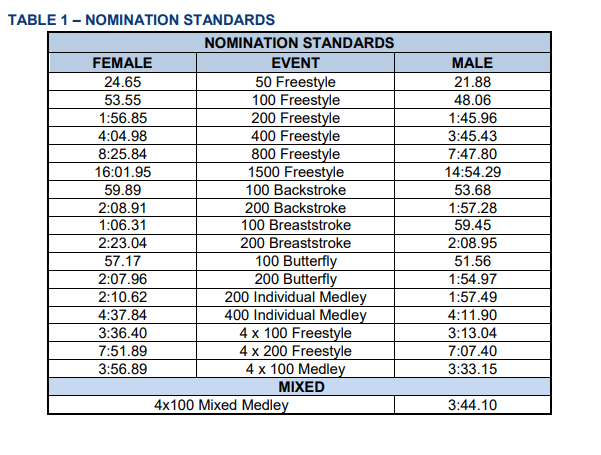Jervis Tops 1500 With Paris-Pass 14:47, Robinson Roars Inside Sub-15 Goal & Davies 20-Year-Old Mark Lives On
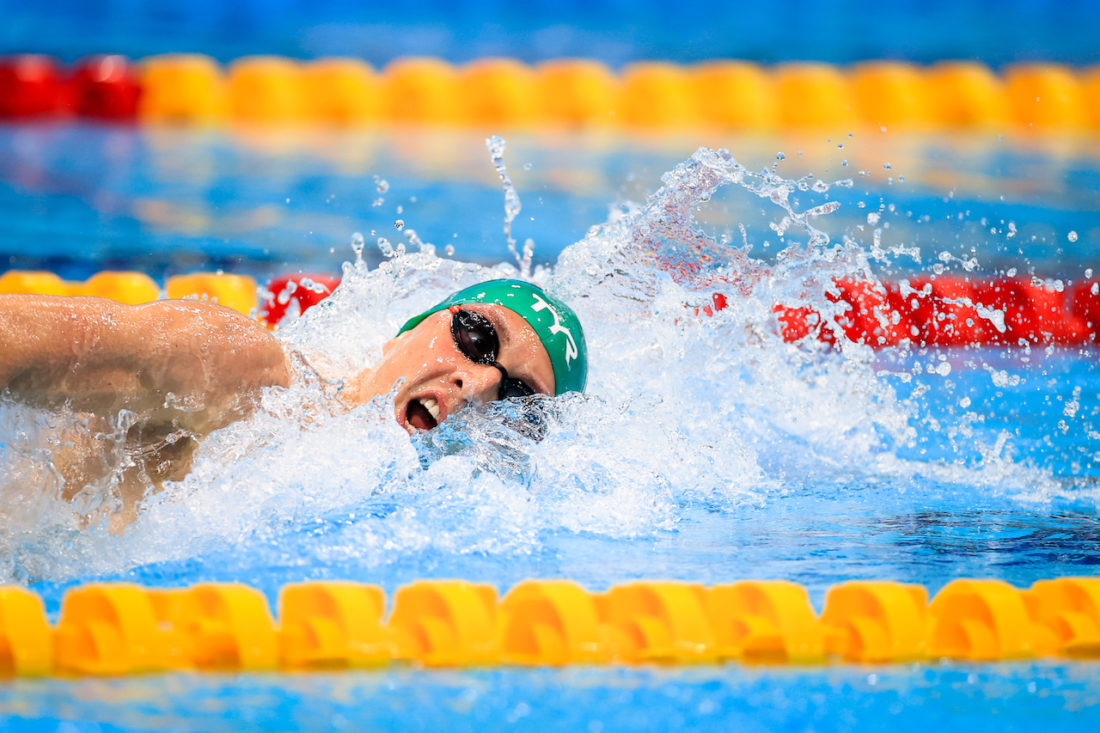
Dan Jervis, on 14:47.94 (David Davies British standard now 20 years old and going strong), will race the 1500m freestyle at the Paris 2024 Olympic Games and may well be joined by Toby Robinson, whose big 14:54.75 lifetime best fell half a second shy of the target time but already has a ticket to the Games, in the marathon.
Jervis has had the British record in his sights on several occasions down the years but the standard live to fight yet another day: the 14:45.95 mark has stood to Davies since he claimed Olympic bronze at the Athens 2004 Games in a battle with Australia’s Grant Hackett and American Larsen Jensen – a good moment to recall Davies’ stellar career (see foot of this file).
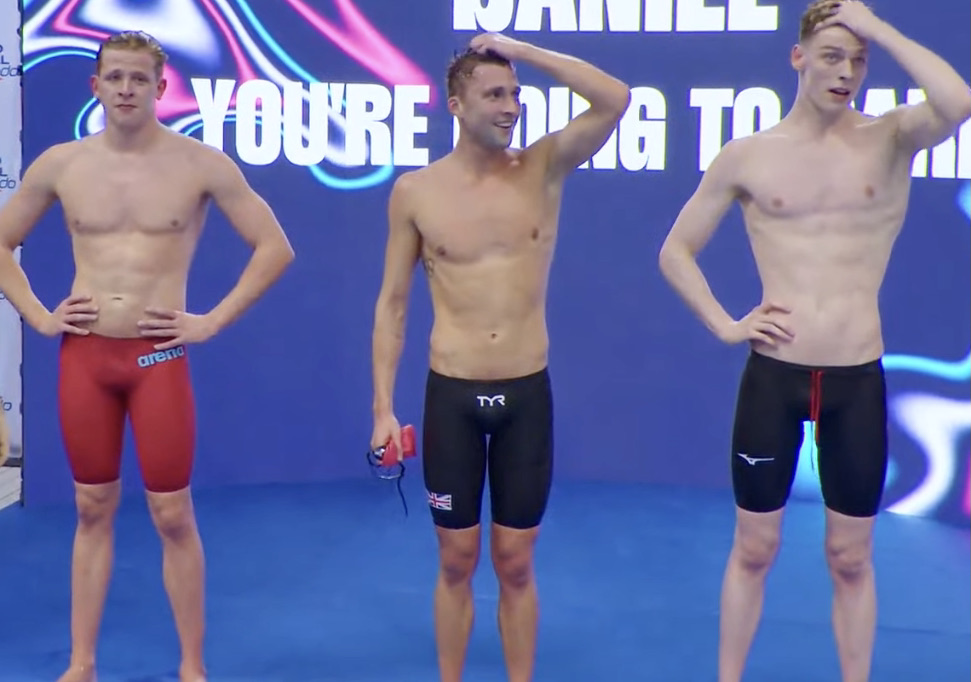
Jervis, 27, was delighted to be back on the Great Britain team three years after his Olympic debut in Tokyo. Today’s ticket, time but more so the moment delivered the “best moment” is his career. He explained: “I was probably most nervous than I’ve ever been. If I’m honest this is the best moment of my swimming career. I’ve got my parents, my family, my friends, I’ve got my partner here. Just I’m just so happy. I could see you all – so that you.”
“His father rushed on to the deck to hug his son, who believed himself “very blessed” to have such “supportive parents”, through thick and thin. Jervis noted: “The last few months I’ve found training really hard. It’s been really tough. I’m 27, I’m not 18 anymore. Training sessions hurt me, so to be honest… whatever we’re doing in training, I leave it up to my coach. I’m very fortunate … I would not be standing here if it weren’t for my coach Adam Baker, so thank you Adam and all the coaches in Swansea and my team.”
Robinson, of Loughborough – training home of Dan Wiffen, Ireland’s Olympic medal hope and double World champion over 800 and 1500m in February – was also delighted: “Open water has been the focus for me this year and I wanted to come in here and see what I could do and hopefully break 15 minutes. That was my aim. To go well below that… I’m just so happy.”
He wasn’t alone, as Kevin Renshaw‘s thread explains:
The podium was completed by Millfield’s Alexander Sargeant in 15:19. 84.
Given that Paris will bring another attempt on the British mark …A good moment to dip into the archive to recall David Davies career: a part work from our tribute when Davies retired in November 2012:
Britain and Wales Distance Ace David Davies Calls Time
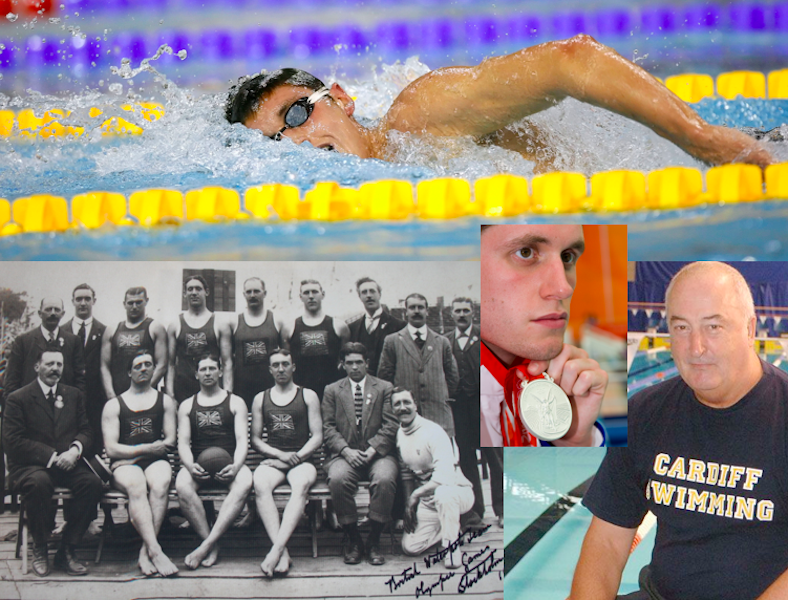
David Davies, Olympic silver (2008) and bronze (2004) medal-winning distance freestyle ace, has retired a decade after his international senior debut for Wales at the 2002 Commonwealth Games.
Davies showed promise as a junior as the heir apparent to Graeme Smith, Britain’s Olympic bronze medallist over 1500m free at the 1996 Atlanta Olympic Games. A finalist over 1500m at the Manchester 2002 Commonwealths, Davies stepped up to take fourth place for Britain at the 2003 World Championships in Barcelona.
With Cardiff coach Dave Haller and Aussie guru Bob Treffene guiding him, Davies was in the form of his life at the Athens 2004 Olympic Games. In a battle with Aussie ironman Grant Hackett and American Larsen Jensen, Davies claimed bronze in the 30-lap final in a European record of 14:45.95, the race producing the fastest 1500m podium in history.
Davies’ time remains the British record and best ever by a Brit by 10sec. He was just 19 and went on to win medals over 1500m at every conceivable level, world, European, short and long, and claimed the Commonwealth title for Wales at Melbourne 2006.
His Athens 2004 success was the first prize in the Olympic pool by a Welshman since Martyn Woodroffe won the silver medal over the 200m butterfly at Mexico City in 1968. The Barry-born distance ace, racing in his first Olympic final, finished just five strokes behind Hackett and a hand behind Jensen.
No man beyond Hackett, 24, and fellow Australian Kieren Perkins, the 1992 and 1996 Olympic champion, had ever dipped below 14min 50sec before at the time. Hackett defended his title in an Olympic record of 14min 43.40sec, with Jensen, 18, and Davies following home in the third and fourth fastest times ever, 14min 45.29sec and 14min 45.95sec.
With his parents cheering him from the stands, Davies also became the first British swimmer to hold the European record over 1500m since Scotland’s Ian Black in 1958.
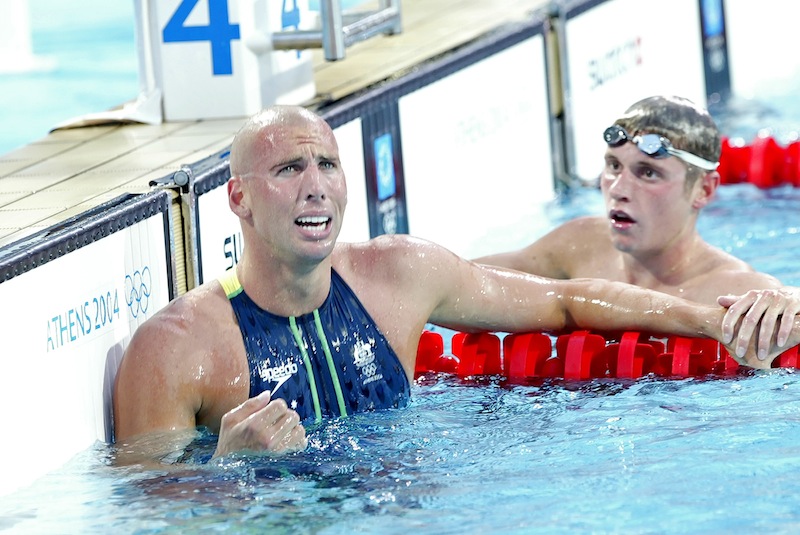
Davies and Jensen were drawn into uncharted waters by Hackett, who won the race by the initial sprint that gave him a 4m lead over the first 50m, and the sprint that brought him home to the title down the last 50m. There was nothing to split the medal winners in the middle of the race, as they clocked a 59-second average every 100m.
A few weeks before the Games, Davies, European junior champion, had been clocking sub 58second splits, a touch under what was needed to match Hackett’s world record of 14min 34.56sec. Haller was there to greet Davies after the race, a fence between them no barrier to a shared experience that needed no fancy words to be spoken, the tears in their eyes speaking volumes for what they had gone through.
Davies’ devotion, dedication and discipline was cited by then performance director to Britain, Bill Sweetenham, as the very model of what it takes to succeed at Olympic level.
It was a measure of the man that in 2008, beyond serious setbacks caused by fatigue syndrome, Davies broke out of the pool and set his sights on success in the alien world of open water. He had no experience at all and while the likes of Hackett could not make the transition, Davies did so to great effect.
It was Loughborough coach Kevin Renshaw who persuaded Davies to take on the 10km challenge before Beijing. The risk was high, and when Davies finished 6th in the 1,500m final in Beijing, it may have seemed to many that all was lost.
Any falling shy of self-imposed expectation is heart-breaking for any athlete who works so hard for so long. The spirit of the world-class athlete will out, though, and Davies and Renshaw removed themselves from the pool squad and village, took their belongings, their hearts, minds and ambitions down to the lake, fitted in well with the successful British oarsmen down at the Shunyi lake and looked at life afresh. Not easy to do. But essential.
“I knew that I had to put it behind me. I had to do anything I could to get back up. I had ice baths, did some easy swimming, enjoyed the company of the canoeists and the rowers,” said Davies later.
On the second day after the 1500m, he started to feel better. On day three he felt good in the water. By the time he lined up for the 10km, he felt determined and confident. It showed, and but for that lack-of-experience home-swim mistake in his third 10km race ever he would surely have won gold.
That went to Maarten van der Weijden, the Dutchman who recovered from cancer on the way to Olympic glory. It was David and Goliath, Van Der Weijden, then 27 and a monster of the waves at 6ft 7.
Davies took the same tactic as teammates Keri-Anne Payne and Cassie Patten the day before, breaking to the front from the start in order to stay out of trouble. Drafting in swimming is estimated by the English Institute of Sport to save 15% on energy. A lot of energy was save in the Beijing racing drafting behind Davies.
Half an hour into the race, Davies was passed by Spyridion Gianniotis, the Brit-born Greek who deliberately moved to a different path so that the Welshman and those drafting in his wake could not tag along behind him. But 10 minutes later, Davies was back at the helm. At 2km out from the finish, Germany’s Thomas Lurz made a break, taking a pack of seven with him, including all the favourites for the crown.
Davies hung on and with 1km to go made a sudden surge, opening up a lead of some 10m at one stage. The Dutchman, Lurz and world champion Vladimir Dyatchin (RUS) followed. At some stage in the next 200m, the Russian was given a red card, his Olympic dream over. The lead three raced on, but were swimming well into the middle of the lake. With 400m to go, all three had to swerve across the course into the path of the home-straight lane lines.
His “head spinning and body gone”, a disorientated Davies headed for the far buoy of the home straight finish lane instead of the near side, taking Lurz with him. Van der Weijden seized the day, tucked in to the finish lane with a 2 metre advantage as his rivals headed across the course and maintained the lead over the final 100m sprint.
Davies, who once said “you know it’s intentional when the girls take their handbags to the starting line” when asked about swimming’s version of the rugby scrum in open water, raced on to London 2012 but his best days were behind him. He raced the 1500m at a home Games and lost out to former training partner at Loughborough, Daniel Fogg, in the battle for a place in the 10km. Fogg finished a worthy 4th in The Serpentine as Davies cheered him on from the sidelines, memories of better personal moments from Beijing floating in heart and mind.
Davies will now to work for Sport Wales helping to inspire the next generation of Olympians. He said:
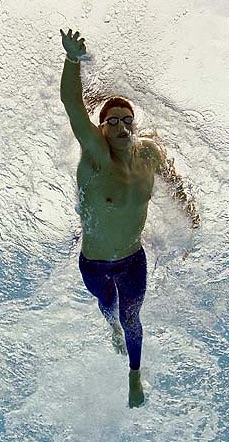
“I have had an amazing career. I have achieved so much more than I ever thought possible when I was a youngster. I have had terrific support from my family and my coach of many years Dave Haller in Cardiff who coached me to my first Olympic medal in Athens. I would also like to thank everyone at British Swimming who has helped me along the way. I had three great years at Loughborough under the guidance of Kevin Renshaw who coached me to a silver medal in Beijing. I have made some fantastic friends along the way.
“I am going on to work as a Performance Lifestyle Advisory/Athlete Mentor for Sport Wales so I hope to stay involved with young swimmers and hopefully help them to achieve their sporting ambitions as I have.”
David Davies – image courtesy of Patrick B. Kraemer
Britain National Performance Director Michael Scott added: “David has had a outstanding swimming career with two Olympic medals and a host of other international distance Freestyle medals from World, Commonwealth and European championships. He has had made a significant contribution to swimming in Britain in his ten years career, and is a fantastic ambassador for the sport. On behalf of British Swimming we wish him all the best in his new endeavours.”
Davies, gracious, professional and pleasant throughout his career from the perspective of this journalist, will be missed in the pool and beyond it in the mixed zone and in his dealings with the media. We wish him all the very best for the future.
Trials Information
- Results in full
- Link to entry list
- Selection policy
- Aquatics GB meet page
- Broadcast & streaming info
- The Vortex: Japanese Olympic trials
- The Cuts:
